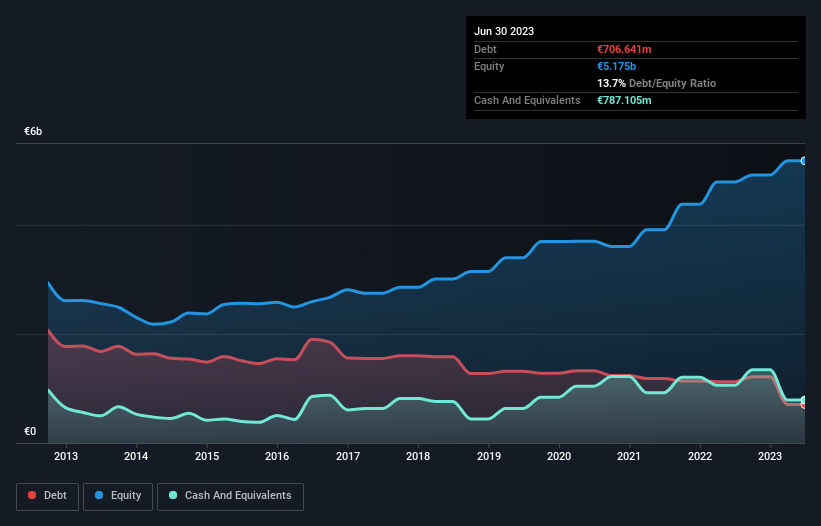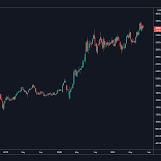- Italy
- /
- Basic Materials
- /
- BIT:BZU
Is Buzzi (BIT:BZU) Using Too Much Debt?
Legendary fund manager Li Lu (who Charlie Munger backed) once said, 'The biggest investment risk is not the volatility of prices, but whether you will suffer a permanent loss of capital.' It's only natural to consider a company's balance sheet when you examine how risky it is, since debt is often involved when a business collapses. We can see that Buzzi S.p.A. (BIT:BZU) does use debt in its business. But the more important question is: how much risk is that debt creating?
When Is Debt Dangerous?
Generally speaking, debt only becomes a real problem when a company can't easily pay it off, either by raising capital or with its own cash flow. Part and parcel of capitalism is the process of 'creative destruction' where failed businesses are mercilessly liquidated by their bankers. However, a more usual (but still expensive) situation is where a company must dilute shareholders at a cheap share price simply to get debt under control. Of course, the upside of debt is that it often represents cheap capital, especially when it replaces dilution in a company with the ability to reinvest at high rates of return. The first thing to do when considering how much debt a business uses is to look at its cash and debt together.
View our latest analysis for Buzzi
What Is Buzzi's Debt?
The image below, which you can click on for greater detail, shows that Buzzi had debt of €706.6m at the end of June 2023, a reduction from €1.12b over a year. However, it does have €787.1m in cash offsetting this, leading to net cash of €80.5m.

A Look At Buzzi's Liabilities
We can see from the most recent balance sheet that Buzzi had liabilities of €746.5m falling due within a year, and liabilities of €1.37b due beyond that. Offsetting these obligations, it had cash of €787.1m as well as receivables valued at €782.4m due within 12 months. So its liabilities outweigh the sum of its cash and (near-term) receivables by €549.4m.
Given Buzzi has a market capitalization of €5.15b, it's hard to believe these liabilities pose much threat. But there are sufficient liabilities that we would certainly recommend shareholders continue to monitor the balance sheet, going forward. While it does have liabilities worth noting, Buzzi also has more cash than debt, so we're pretty confident it can manage its debt safely.
Fortunately, Buzzi grew its EBIT by 3.7% in the last year, making that debt load look even more manageable. When analysing debt levels, the balance sheet is the obvious place to start. But ultimately the future profitability of the business will decide if Buzzi can strengthen its balance sheet over time. So if you're focused on the future you can check out this free report showing analyst profit forecasts.
Finally, a business needs free cash flow to pay off debt; accounting profits just don't cut it. While Buzzi has net cash on its balance sheet, it's still worth taking a look at its ability to convert earnings before interest and tax (EBIT) to free cash flow, to help us understand how quickly it is building (or eroding) that cash balance. In the last three years, Buzzi's free cash flow amounted to 48% of its EBIT, less than we'd expect. That's not great, when it comes to paying down debt.
Summing Up
While Buzzi does have more liabilities than liquid assets, it also has net cash of €80.5m. On top of that, it increased its EBIT by 3.7% in the last twelve months. So we don't have any problem with Buzzi's use of debt. The balance sheet is clearly the area to focus on when you are analysing debt. However, not all investment risk resides within the balance sheet - far from it. These risks can be hard to spot. Every company has them, and we've spotted 1 warning sign for Buzzi you should know about.
When all is said and done, sometimes its easier to focus on companies that don't even need debt. Readers can access a list of growth stocks with zero net debt 100% free, right now.
Valuation is complex, but we're here to simplify it.
Discover if Buzzi might be undervalued or overvalued with our detailed analysis, featuring fair value estimates, potential risks, dividends, insider trades, and its financial condition.
Access Free AnalysisHave feedback on this article? Concerned about the content? Get in touch with us directly. Alternatively, email editorial-team (at) simplywallst.com.
This article by Simply Wall St is general in nature. We provide commentary based on historical data and analyst forecasts only using an unbiased methodology and our articles are not intended to be financial advice. It does not constitute a recommendation to buy or sell any stock, and does not take account of your objectives, or your financial situation. We aim to bring you long-term focused analysis driven by fundamental data. Note that our analysis may not factor in the latest price-sensitive company announcements or qualitative material. Simply Wall St has no position in any stocks mentioned.
About BIT:BZU
Buzzi
Manufactures, distributes, and sells cement, ready-mix concrete, and natural aggregates.
Flawless balance sheet average dividend payer.
Similar Companies
Market Insights
Weekly Picks


Looking to be second time lucky with a game-changing new product

PlaySide Studios: Market Is Sleeping on a Potential 10M+ Unit Breakout Year, FY26 Could Be the Rerate of the Decade


Inotiv NAMs Test Center

This isn’t speculation — this is confirmation.A Schedule 13G was filed, not a 13D, meaning this is passive institutional capital, not acti
Recently Updated Narratives


Inotiv NAMs Test Center


Goldman Sachs Group (GS) The Titan Reclaims Its Crown: Return to Core Excellence


Parker-Hannifin (PH) The Industrial Alchemist: Transforming Motion into Margin
Popular Narratives


Is Ubisoft the Market’s Biggest Pricing Error? Why Forensic Value Points to €33 Per Share


Analyst Commentary Highlights Microsoft AI Momentum and Upward Valuation Amid Growth and Competitive Risks


The "Physical AI" Monopoly – A New Industrial Revolution
Trending Discussion




